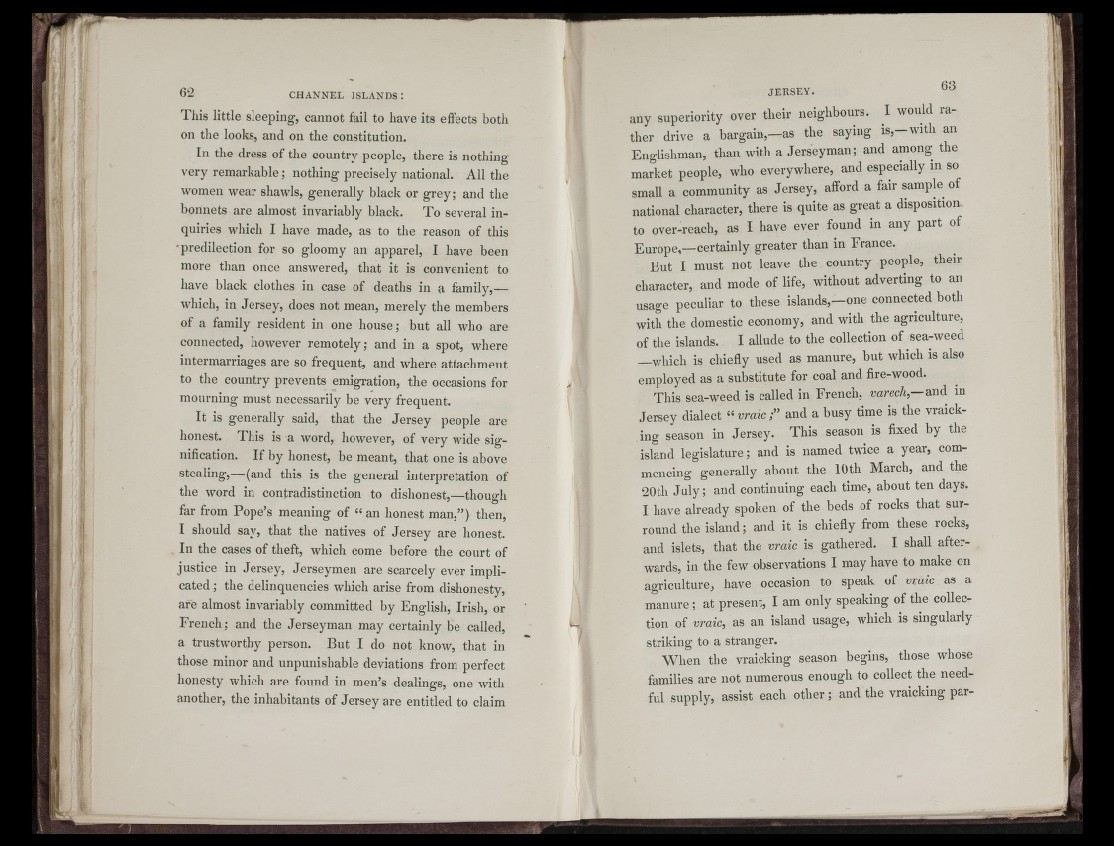
il:
This little sleeping, cannot fail to have its effects both
on the looks, and on the constitution.
In the dress of the country people, there is nothing
very remarkable; nothing precisely national. All the
women wear shawls, generally black or grey; and the
bonnets are almost invariably black. To several inquiries
which I have made, as to the reason of this
'predilection for so gloomy an apparel, I have been
more than once answered, that it is convenient to
have black clothes in case of deaths in a family,—
which, in Jersey, does not mean, merely the members
of a family resident in one house; but all who are
connected, however remotely; and in a spot, where
intermarriages are so frequent, and where attachment
to the country prevents emigration, the occasions for
mourning must necessarily be very frequent.
It is generally said, that the Jersey people are
honest. This is a word, however, of very wide signification.
If by honest, be meant, that one is above
stealing,—(and this is the general interpretation of
the word in contradistinction to dishonest,—though
far from Pope’s meaning of “ an honest man,” ) then,
I should say, that the natives of Jersey are honest.
In the cases of theft, which come before the court of
justice in Jersey, Jerseymen are scarcely ei^er implicated
; the delinquencies which arise from dishonesty,
are almost invariably committed by English, Irish, or
French; and the Jerseyman may certainly be called,
a trustworthy person. But I do not know, that in
those minor and unpunishable deviations from perfect
honesty which are found in men’s dealings, one with
another, the inhabitants of Jersey are entitled to claim
any superiority over their neighbours. I would rather
drive a b a rg a in ,-a s the saying is ,-w ith an
Englishman, than with a Jerseyman; and among the
market people, who everywhere, and especially m so
small a community as Jersey, afford a fair sample of
national character, there is quite as great a disposition
to over-reach, as I have ever found in any part of
Europe,—certainly greater than in France.
But I must not leave the country people, their
character, and mode of life, without adverting to an
usage peculiar to these islands,—one connected both
with the domestic economy, and with the agriculture,
of the islands. I allude to the collection of sea-weed
—which is chiefly used as manure, but which is also
employed as a substitute for coal and fire-wood.
This sea-weed is called in French, i?arec/i,—and in
Jersey dialect “ w a/c ;” and a busy time is the vraick-
ing season in Jersey. This season is fixed by the
island legislature; and is named twice a year, commencing
generally about the 10th March, and the
20th July ; and continuing each time, about ten days.
I have already spoken of the beds of rocks that surround
the island; and it is chiefly from these rocks,
and islets, that the vraic is gathered. I shall afterwards,
in the few observations I may have to make on
agriculture, have occasion to speak of vraic as a
manure ; at present, I am only speaking of the collection
of vraic, as an island usage, which is singularly
striking to a stranger.
When the vraieking season begins, those whose
families are not numerous enough to collect the needful
supply, assist each other ; and the vraicking par